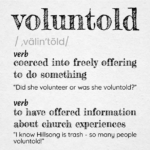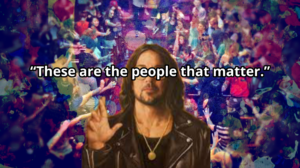I was talking with a friend recently and they mentioned how they have been careful to make sure that their TikTok algorithm doesn’t show them stuff related to religious trauma – no deconstruction, no exvangelical, ex-hillsong, ex-Christian, no ex-anything and, in conclusion, no me. And I get it. A high percentage of my closest “real life” friends pay no attention to me on the internet. Like none. If I’m doing something multimedia (like Heart For This House), they’ll support me, but in regular day-to-day life, internet interactions and actual conversations about the place(s) and the faith that originally brought us together are rarely had. We’ll occasionally laugh and/or cringe about shared memories, but for folks coming from a faith that taught us to always have a ready answer, we don’t have many questions for each other. They can see how I’m living and all the sin I have fallen into which is a fairly lame amount if I do say so myself. Which makes me even madder about the amount of trash behavior the Lentzs (and the like) had time to engage in while they were on the spiritual clock. When I think about Carl striking up an affair, I mean, a conversation at a park, I get so mad realizing he had time to go to the park! That useless motherfu- and I know, I know:
Nobody is perfect.
True. But not everybody is an uneducated man with unchecked character issues; so why does that seem to be the evangelical god’s go-to? And who was asking for perfection? Somewhere out there exists the person(s) who left church “because the pastor wasn’t perfect” but I have yet to meet them. Instead, I have conversations with people who tied themselves into all kinds of knots to rebrand major faults as mere imperfections. Because…
Let he who is without sin cast the first stone.
First of all, this is a Wendy’s. Calm down. Nobody is trying to kill anyone. And your pastor, leader, favorite faith action figure is not a nameless marginalized character being targeted by… who? You, with your questions? The media with their facts? Or is it me with my observations? To a hammer, everything looks like a nail and to an indoctrinated follower everything looks like a rock but…
Consequences are not persecution.
No one is entitled to be over anyone else. Because capitalism, we make social contracts where we agree to temporarily exchange pieces of our autonomy for money, for food, housing, security, etc. To get our needs and wants met, we let others tell us what to do, within certain parameters, for a certain amount of time. (No parameters & no limitations = slavery) And if either party doesn’t fulfill their part of the contract, they run the risk of losing it. That’s not persecution. That’s just the deal. It does get a little tricky with pastors – who works for who? But either way, I do not feel bad for pastors who do a bad job and don’t get to pastor anymore.
But look at all the good…
For who and for what? Define good. And tell me what awful things you’re comfortable having happen to others for your good. Jesus died and Frank Houston was a violent pedophile, for me. Jesus died and Brian Houston has promoted and protected abusers, for me. Jesus died and Carl Lentz “trained” and platformed biblically illiterate assholes, for me. Jesus died and the volunteers at Hillsong conference were mistreated while pastors were pampered, for me. Are you good with that? With knowing that your salvation required not just the physical death of Jesus, but the mental, emotional, spiritual and physical devastation of countless others? That’s what it took for an all-powerful “good” god to get to you?
Sometimes I think about the story of the Tower of Babel. Humanity started building a tower, to build a name for themselves. (Note: Not to get to Heaven, not to get to God, to build a name for themselves. Look it up.) And God saw what they were doing and that nothing they planned would be impossible as long as they were speaking the same language, so God spiced up the dialogue. It is no coincidence that the more people have begun to speak up, the more difficult it has been for institutions that have made a name for themselves to continue to build. And that is a good thing.
That story of Babel begins with the people involved laying out their intentions: to make a name for themselves with what they built and not be scattered, and the story ends with them making it into the Bible for what they tried to do and God scattering them. From the beginning, their plans were their plans – not God’s – about themselves. And even though I feel very safe betting the people putting in work had some good moments and made some good memories, the thing they were part of building was never actually good. And the more I learn about the history of Hillsong, the more evident it becomes that it was never a good idea. It was never good. I don’t think it started with a big nefarious plan to be a worldwide menace, I think the original intent is the one that has carried through to every campus in every country: to provide an uneducated, unqualified man with an audience and an income. It has never been about protecting or providing for the people building it, if it was, Hillsong would have shut itself down a thousand times over. But it hasn’t. And it won’t as long as its intentions are still being met.
You can tell Hillsong is not about the people building it by what happens when the people stop building – whether it’s because they left or because a campus ceased to exist. The day after Hillsong ends, people scatter. And that’s it. If Hillsong notices an absence, it’s only because of how it affects Hillsong, they may inquire after equipment they want returned, but they will never consider all that was given. Why would they? It was the least you could do. They might actually say that. If you speak about your experience, Hillsong will pretend like the Hillsong you were part of never actually existed – it was just your perception. All that time, energy, talent and money that you put into Hillsong, that was for God and you should have kept looking to Him. The mistreatment and pain you experienced, that was from imperfect people and you never should have been looking to them. And that bad pastor Brian Houston chose for your campus? Well you left and/or he’s gone now, so forgive and forget. And forget any chance of getting help for any wounds inflicted.
The allure of something like a Hillsong is its appearance of success. It’s big so it must be good. (That’s what she said.) But being well-known is not synonymous with being well. And Hillsong is not well. I don’t fault anyone for getting taken in by Hillsong. Way too many of us spend way too much time asking ourselves how we could have been so stupid, but we weren’t stupid – We were fooled by people who intended to fool us. We shouldn’t feel ashamed for trusting, they should be ashamed for abusing trust. But they aren’t. They do not care. They scatter. Carl Lentz put up his Instagram apology and never looked back. The unqualified leaders he unleashed into ministry scrubbed Hillsong from their profiles and slithered into new pastoral positions. And after ten years in New York, the institution that allegedly came here to impact and empower the people of New York, hadn’t made enough impact to empower anyone from New York to lead. It was all a scam. A hustle. (#HillsongHustlers – it was right there!) A colonizing sham. And if you’re still there, you’re complicit. You’re building a bad thing and you need to ask yourself why. And maybe that’s aggressive, but so is Christianity. How is it fine to tell people they were born bad and need a savior to keep from burning eternally, but wild to say that a church was built bad and needs to burn here and now?
Whenever the pressure gets too high and the questions are too valid, Hillsong leaders always starts warning members against listening to the “wrong” voices, but ultimately, Hillsong is one of the most effective voices at talking people out of Hillsong. My VOLUNTOLD highlights on Instagram contain over 200 accounts of things experienced by folks trying (and failing) to make Hillsong into what it kept claiming to be. At some point, the dissonance just gets too loud.
I look forward to the end of Hillsong with equal amounts of anticipation and dread, knowing that a lot of people will just scatter to likeminded institutions – other megachurches and ministries that feature the same kinds of methods and megalomaniacs. (Pro-tip: How does your church or the church you’re thinking about attending use the story of The Widow’s Mite? If it is to encourage you to give your last instead of to critique an institution that would take it from you, it’s trash.) Toxic evangelicalism is so pervasive, it often feels impossible to imagine another way, until I remember that I got out. And that’s all I had to do. I didn’t know what was next for me, so I certainly don’t know for anyone else. But I know what it’s like to find others speaking languages I can understand. And there’s something indescribably beautiful about speaking with people I knew, but couldn’t really get to know when we were sticking to the scripts; to look back at how much of ourselves we sacrificed to build something was never for us and look around now at simple everyday joys that were simply unimaginable back then. To find and use our words to shape new worlds and full lives where Hillsong has no say-so and no power. Can you believe we get to do this?




